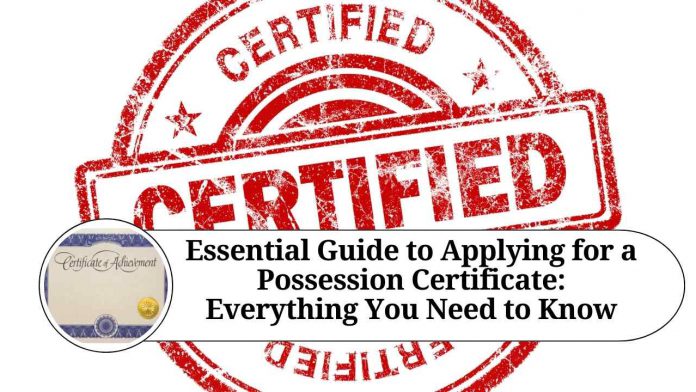Step 1: Determine the Type of Possession Certificate Required
There are different types of possession certificates issued by the government, and the requirements for each vary. It is important to determine which type of possession certificate you require before proceeding with the application process. The three most common types of possession certificates are:
- Agricultural Land Possession Certificate: This type of possession certificate is issued for agricultural land.
- Non-Agricultural Land Possession Certificate: This type of possession certificate is issued for non-agricultural land.
- House Possession Certificate: This type of possession certificate is issued for houses or residential properties.
Step 2: Gather the Required Documents
Once you have determined the type of possession certificate you require, you will need to gather the necessary documents. These typically include:
- Application form: This can be obtained from the local government office or online.
- Identity proof: A copy of your Aadhaar card, passport, or voter ID card.
- Proof of ownership: This includes the sale deed, gift deed, or lease deed.
- Tax receipts: The latest tax receipts for the property.
- Encumbrance certificate: This certificate is used to ensure that the property is free from any legal disputes or liabilities.
- Property map: A copy of the property map.
Step 3: Submit the Application
Once you have gathered all the required documents, you can apply for a possession certificate. This can be done at the local government office or online, depending on the procedures in your area.
Step 4: Verification
After you have applied, the government will conduct a verification process to ensure that you are the rightful owner of the property. This may involve a physical inspection of the property.
Step 5: Issuance of Possession Certificate
Once the verification process is complete, and your application is approved, the government will issue the possession certificate to you. This document will serve as proof of your ownership of the property.
In addition to the steps outlined in the previous section, there are a few more important things to keep in mind when applying for a possession certificate.
- Know the Fees: Possession certificates usually require a fee to be paid to the government. The fee varies depending on the type of possession certificate required and the area where the property is located. It is important to find out the exact fee that needs to be paid and have it ready when applying.
- Understand the Timeframe: The time taken to process and issue a possession certificate can vary depending on the procedures in your area. It is important to have a clear understanding of the expected timeframe for the process, as this will help you plan accordingly.
- Check the Details: Before submitting your application, it is important to double-check all the details and ensure that they are accurate. Any mistakes or discrepancies could lead to delays or rejection of the application.
- Keep a Record: Once you have submitted your application, it is a good idea to keep a record of the application number or reference number. This will help you track the progress of your application and follow up if necessary.
- Follow Up: In some cases, the government may require additional information or documents to complete the verification process. If you have not heard back from the government after the expected timeframe, it is a good idea to follow up and check on the status of your application.
By following these additional tips, you can ensure that your application for a possession certificate goes smoothly and is processed promptly. A possession certificate is a crucial document for establishing legal ownership of a property, and obtaining one can provide peace of mind and protect your investment in the property.
Other Related Blogs: Section 144B Income Tax Act
Here are some frequently asked questions (FAQs) about possession certificates:
Q: What is a possession certificate?
A: A possession certificate is a legal document issued by the government that proves the possession of a particular piece of property.
Q: Why do I need a possession certificate?
A: A possession certificate is important for establishing legal ownership of a property. It serves as proof that you have possession of the property and can be used in legal disputes or transactions involving the property.
Q: How do I apply for a possession certificate?
A: The process for applying for a possession certificate varies depending on the procedures in your area. Generally, you will need to gather the necessary documents, submit an application, and go through a verification process.
Q: What documents do I need to apply for a possession certificate?
A: The required documents for a possession certificate include an application form, identity proof, proof of ownership, tax receipts, encumbrance certificate, and property map.
Q: How long does it take to get a possession certificate?
A: The timeframe for getting a possession certificate can vary depending on the procedures in your area. It is important to have a clear understanding of the expected timeframe and plan accordingly.
Q: How much does a possession certificate cost?
A: The fee for a possession certificate varies depending on the type of possession certificate required and the area where the property is located.
Q: What if my application is rejected?
A: If your application for a possession certificate is rejected, you may need to provide additional information or documents to support your application. It is important to follow up and find out the reason for rejection.
Q: What if there is a dispute over possession of the property?
A: If there is a dispute over possession of the property, a possession certificate can be used as evidence in legal proceedings. It is important to consult with a legal professional for guidance in such situations.




















